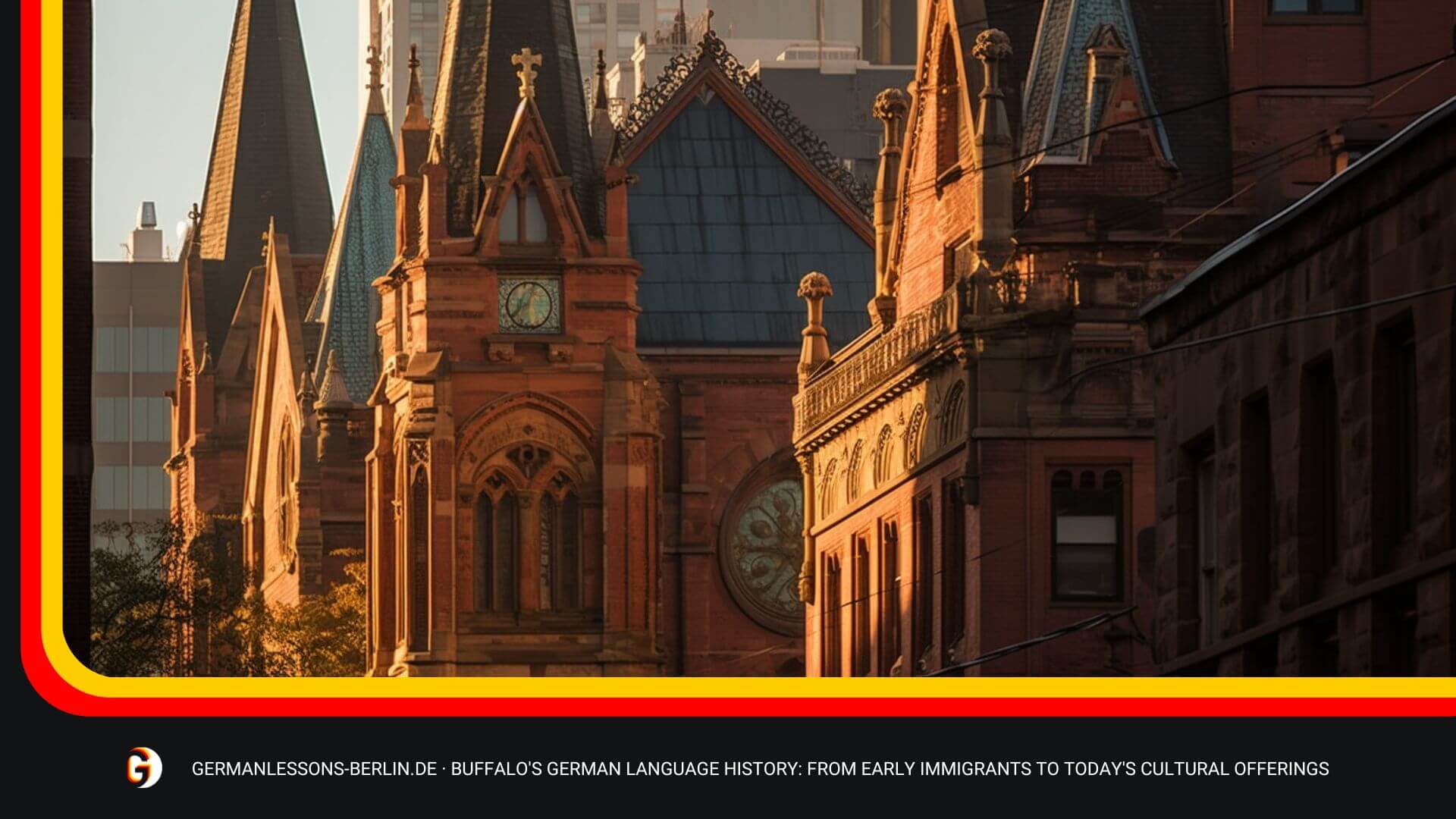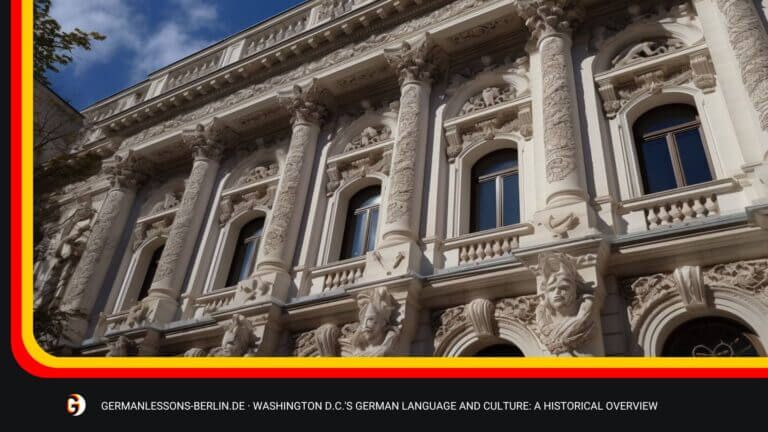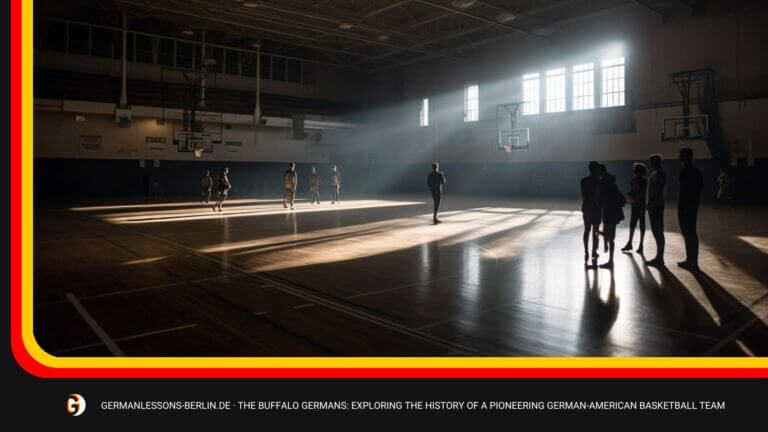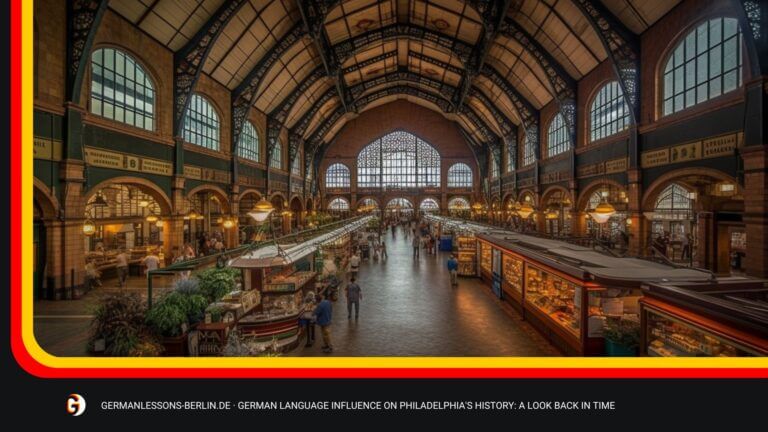The German language has been intertwined with the history of Buffalo, New York, for centuries. From its early days as a bustling port to today’s rich cultural offerings, German-speaking immigrants and their descendants have left an indelible mark on the city’s development. This article will explore Buffalo’s fascinating journey regarding its relationship with this unique language—from its initial introduction by waves of European settlers, through the community’s evolution over time, right up to the present day!
Throughout its existence, Buffalo has served as a primary destination for German immigration into America. Despite attempts by some authorities to suppress it during World War I and II, Buffalo’s heritage was too strong; generations of speakers kept the language alive even in moments when speaking it wasn’t necessarily encouraged. As such, it was only natural that German would become one of the most popular languages spoken in and around the city.
Today, those same efforts are paying off: there are now numerous opportunities for anyone interested in learning about or engaging with German culture in and around Buffalo. Whether you’re keen to learn more about how this vibrant language came to be part of our past or want to experience all that modern-day Germany has to offer – visually and vocally – this article is here to help guide you on your way!
Table of Contents
Overview Of German Roots In Buffalo
German immigration to Buffalo, New York, dates back to the city’s earliest days. German-speaking immigrants from Bavaria and Prussia settled in the area during the mid-19th century. Since then, their language and culture have become deeply rooted in Buffalo’s history and identity.
The impact of these early settlers is still felt today in Buffalo’s many German restaurants, churches, schools, and organizations. The influence of this heritage can also be seen in popular annual events such as Oktoberfest and Christmas markets that celebrate German traditions. This rich cultural offering has made Buffalo an exciting destination for those exploring the German language or its associated customs.
Buffalo is not only a great place to experience traditional German cuisine, but it is also home to several institutions dedicated to preserving the local Germanic legacy. Organizations like the Heinrich Heine Society promote education on topics related to Germany while providing resources for those interested in learning more about their heritage. There are even classes available at various universities where students can study modern German literature and linguistics, which serve as another way to appreciate this vibrant part of their community’s past.
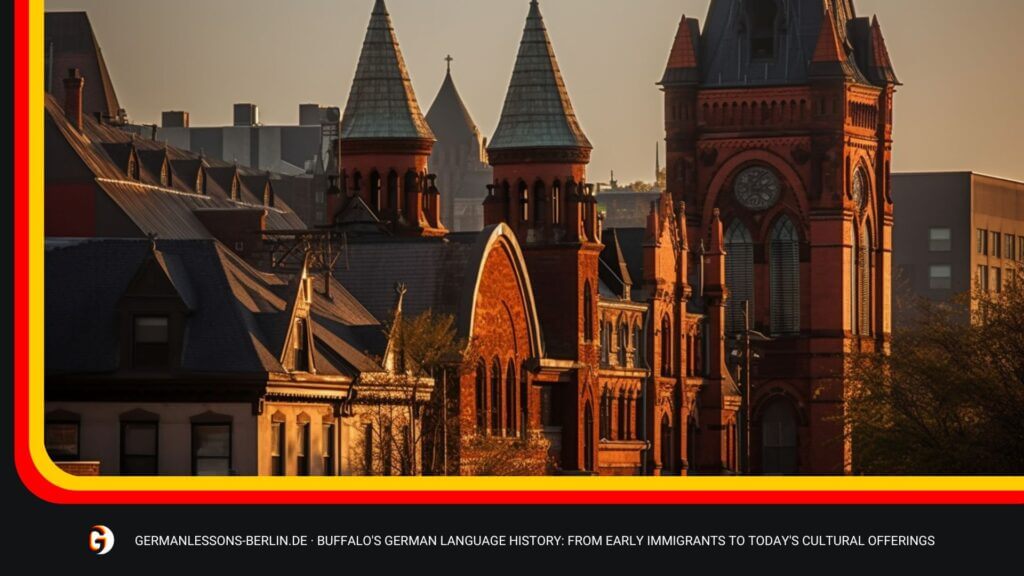
Immigration Patterns Throughout History
Buffalo has been a city of immigrants for centuries. German immigrants are no exception, and the area’s German language roots stretch back to the early 1800s when many settlers came from Germany seeking religious freedom and economic opportunity. Over time, immigration patterns shifted from waves of large numbers of Germans arriving in Buffalo during specific periods to more minor influxes over extended periods.
The mid-1800s saw many German immigrants coming to Buffalo due to famine and political unrest in their homeland. During this period, some neighborhoods became predominantly populated with German-speaking people who established churches, schools, and businesses. Many of these institutions still exist today as important markers of cultural heritage that help connect past generations to present-day offerings like festivals celebrating Oktoberfest or traditional food specialties found at local restaurants.
More recently, we have seen an uptick in new immigrants from Germany looking for job opportunities or higher educational pursuits. The presence of already established German-language organizations here helps make transitioning into life in America easier for them by providing resources such as classes on learning English and other aid programs available through local community centers. This is beneficial not only for those trying to learn about American culture but also for current citizens eager to learn more about the rich history associated with the region’s long-held german language influence.
Despite changing demographics within the area, one thing remains constant: Buffalo continues to be enriched by its vibrant mix of cultures brought together by old and new individuals who seek out what our great city has to offer.
Preservation Of German Culture And Language
The German language has been an integral part of the fabric of Buffalo’s culture since its very beginnings. From early immigrants in the 19th century to today, there have been ongoing efforts to preserve and celebrate the city’s rich German-American heritage. Here are some ways that this is happening:
- Language Preservation Initiatives: The city of Buffalo offers several programs aimed at preserving the German language and culture, such as classes for adults, translation services, and other initiatives. These programs provide essential support for those who want to learn or maintain their knowledge of the language.
- Cultural Centers: Organizations like Goethe Institute offer cultural centers dedicated to fostering understanding between Germany and America by providing courses on topics ranging from literature and philosophy to history and geography. The institute also organizes yearly events celebrating Buffalo’s diverse German-American heritage.
- Classes & Programs: There are numerous opportunities for learning about the German language and culture across Buffalo. From community colleges offering courses for credit to non-profit organizations hosting free workshops, these offerings allow anyone interested in exploring more about their roots or just curious about the language an opportunity to do so without having to travel abroad.
This rich history provides Buffalonians with a unique window into American and European cultures, giving them access to resources they may be unable to find elsewhere. With various initiatives promoting awareness, appreciation, and education around all aspects of the German language and culture, Buffalo continues its legacy as one of America’s most vibrant hubs for everything related to Deutschland!
The Legacy Of The Germans In Buffalo
German immigrants have left a lasting legacy in Buffalo. German Americans were integral to the city’s development, growth, and culture. From early settlers to today’s citizens, they continue influencing Buffalo with their language, customs, food, and more.
The history of Germans in Buffalo can be traced back to the mid-19th century when thousands arrived from Germany seeking economic opportunities. The influx of these new immigrants created a unique cultural landscape unlike anything else found at that time. They established churches and businesses that would become part of the city’s fabric for decades.
Today, German heritage plays a vital role in Buffalo’s identity. From Oktoberfest celebrations to traditional foods like bratwurst, sauerkraut, and strudel, modern Buffalonians connect with their German roots in many ways. Additionally, organizations such as the German American Heritage Society of Western New York promote local events and educational programs focused on preserving this valuable piece of our shared cultural history.
Buffalo is a diverse place full of people who share different cultures and backgrounds – but a shared appreciation also unites it for its rich German-American legacy. This unique mix has been woven into the very fabric of this great city for generations -and will likely remain so long into the future!
German-American Societies And Organizations
Since the earliest days of Buffalo’s German-American population, various societies and organizations have been formed to represent the diverse interests of this community. These include German-American clubs, associations, groups, and other social networks that support new immigrants and those already established in the region.
The first such organization was founded in 1848 by John A. Schoellkopf to help newly arrived Germans adjust to their new lives in America. The society provided employment assistance and advocated on behalf of German Americans. Other early German-American organizations included the Deutscher Turnverein (or “German Gymnastic Club”), which promoted physical fitness among its members, and the Gesangverein Harmonie, which organized singing competitions around Buffalo.
Today there is plenty of offerings for anyone interested in learning about or celebrating Buffalo’s long history of embracing its German roots. In recent years, other societies have been created to preserve cultural traditions unique to Buffalo’s German-American community. Examples include the Niagara Frontier Heritage Alliance, dedicated to celebrating traditional holidays like Fasching, and several museums explicitly devoted to exploring Germany’s heritage through art, music, literature, and food.
Popular Festivals And Events Celebrating German Heritage
Buffalo’s German-American societies and organizations have long been a significant influence in preserving the city’s rich German heritage. Today, those same groups continue to organize many popular festivals and events celebrating the language, culture, and history of Germans living in Buffalo.
One such event is Oktoberfest Niagara Falls USA, which takes place for several days each fall at Old Falls Street in downtown Niagara Falls. This family-friendly celebration features traditional Bavarian music, dancing, food, beer tastings from local breweries, carnival rides, games, and arts and crafts vendors. Another annual gathering celebrating German culture is the Buffalo Wurst Fest hosted by Bison Hall Brewery & Taproom every October. Attendees can enjoy authentic sausages made with locally sourced ingredients while listening to live oompah bands and participating in fun activities like bratwurst eating contests.
In addition to these more significant events, there are numerous smaller festivals throughout the year that recognize Germany’s cultural impact on Buffalo, including Stammtisch (a monthly gathering for people who speak or want to learn German), the Deutsche Tage festival held annually at Canalside Park since 2008, Live From Linwood (an outdoor summer concert series featuring polka music), Historical Society of North German Settlements’ Kirmes day celebrations honoring regional traditions with parades and processions, and more. Together they serve as an important reminder of how deeply intertwined our two cultures have become over time – making it possible for all Buffalonians to take part in exploring their shared roots through these festive occasions.
Educational Opportunities For Learning About the German Language And Culture
Buffalo has long served as a hub for the German language and culture. This is evidenced by the numerous educational opportunities for those seeking to learn more about this rich heritage. From dedicated classes to schools offering comprehensive courses in both language and culture, Buffalo provides abundant resources that enable people of all ages to expand their knowledge base.
The following table outlines some of the most prominent institutions currently providing instruction on the German language and culture:
| Institution | Type of Instruction Offered |
|---|---|
| The University at Buffalo | German Language Classes & Cultural Programs |
| Graduate School of Education | German Language Courses & Heritage Classes |
| International Institute | German Language Schools |
UB provides various programs to teach students the basics of the German language, such as pronunciation and grammar. In addition, they offer cultural programming designed to enhance understanding of Germany’s history and art forms. The University at Buffalo School of Education also offers courses on developing proficiency in reading, writing, speaking, and comprehension skills related to the German language. Finally, several options are available through the International Institute, which provides intensive learning experiences taught in traditional school settings.
These organizations have become invaluable resources for anyone wanting to explore deeper into this unique tradition. Whether looking to improve linguistic abilities or gain a better appreciation for its customs and beliefs, these institutions can help individuals develop an understanding that will last a lifetime.
Modern Businesses With A German Influence
The German influence on Buffalo is still influential today, with many businesses showing their German roots. There are numerous German-owned businesses in the area, from restaurants to bakeries and bookstores. These businesses offer a unique experience for those who wish to explore the culture and language of Germany.
German-influenced restaurants have become increasingly popular, offering traditional dishes such as schnitzel and sauerbraten. Some even host events like Oktoberfest, which celebrates all things German. For those looking for something sweet, plenty of German-style bakeries serve up delicious pastries and cakes inspired by the country’s recipes. To further appreciate the language, locals can visit one of several German-language bookstores in town, stocking books on everything from literature to cooking.
For those wanting a more casual way to enjoy some local beer while chatting with friends or making new acquaintances, there are also plenty of authentic German-style pubs around Buffalo where visitors can try different beers brewed according to centuries-old traditions native to Germany. With so many beautiful options available, it’s easy to see why people flock here year after year to get a taste of this fascinating culture and its long history in Buffalo.
Community Centers Focused On Promoting German Language And Culture
The German-American community of Buffalo has a rich history of language and culture. This is evidenced by the many centers, classes, events, and groups established to preserve their heritage. Here are three prominent examples:
- The Buffalo Schwaben Club – Established in 1921, this club offers members a variety of German cultural activities, including social gatherings and traditional dances. They also provide language classes for adults and children so they can learn more about their ancestry and keep the language alive.
- The East Side German Cultural Center – Founded in 1978, hosts numerous events throughout the year celebrating different aspects of German heritage. From Oktoberfest celebrations to classical music concerts, there is something for everyone here! In addition to these functions, the center also provides weekly conversation clubs where people can practice speaking the language with other native speakers or those looking to brush up on their skills.
- The Hamburg Historical Society – Since its founding in 1895, this society has worked diligently to document and promote awareness of Germans’ significant contributions to Western New York’s culture. It holds monthly meetings featuring guest speakers who discuss topics related to local history and special exhibits showcasing artifacts from past generations. It also offers educational trips, including museum visits dedicated to preserving stories of German immigrants who settled in our region centuries ago.
These organizations play an essential role in helping maintain Buffalo’s unique germanic identity while providing new opportunities for citizens to connect through shared experiences and appreciation for their roots. By engaging current residents and descendants of early settlers alike, these entities serve as invaluable resources that help shape our city’s vibrant multicultural landscape today–and will continue doing so into the future!
Reflection On The Role Of Germans In Buffalo Today
Germans have been integral to Buffalo’s history and culture since the city’s founding in 1804. German Americans have profoundly influenced the region, from establishing some of the country’s earliest churches to introducing various cultural activities that remain active today. It is clear that over time, Germans have left an indelible mark on this upstate New York city.
Throughout history, the German language has played a prominent role in Buffalo. From early immigrants who used it to communicate with each other to more recent generations who used it for educational purposes, including attending classes at local schools or universities, the German language has been continuously present throughout the past two centuries. Additionally, several organizations dedicated to preserving the native tongue can be found around the area. Moreover, festivals such as “Oktoberfest” are held annually to celebrate German heritage and culture in Buffalo. This demonstrates how deeply the German language is embedded within the city’s social fabric.
The presence of the German language and culture remains strong in Buffalo today – evidence of its lasting impact and importance for locals across all backgrounds. By embracing their roots, many people continue to pass down traditional values while also showing appreciation for those traditions by actively participating in them – thus perpetuating a living connection between themselves and their ancestors who first arrived here long ago. As such, Germans remain integral members of Buffalo society even now, providing invaluable contributions through their language and various aspects of everyday life that shape our collective experience here in Western New York State.
Frequently Asked Questions
How Can I Learn Basic German Language Skills?
If you are interested in learning basic German language skills, a variety of courses, classes, and other offerings are available to get started. The options are numerous, from private tutors offering one-on-one instruction to online programs that allow for practice at your own pace. Something will likely fit your needs, whether you want to learn simple conversational phrases or gain more in-depth knowledge of grammar and syntax.
One great way to explore German language learning opportunities is by searching for local resources like German language classes or tutoring services offered in Buffalo. Several organizations and educational centers throughout the city provide specialized sessions tailored specifically to those interested in taking on this new challenge. For example, The Goethe Institut Buffalo includes group classes and intensive seminars for adult learners who want to take their language understanding to another level. Additionally, some colleges may offer continuing education courses focused solely on mastering certain aspects of the German language.
For those who prefer self-study over traditional classroom settings, many excellent online programs are designed with beginners in mind. Many websites provide lessons accompanied by audio recordings and exercises that can help improve pronunciation and build a vocabulary quickly; they also usually feature interactive tools like quizzes and flashcards, which make memorizing words more accessible than ever before. Furthermore, these programs often include teaching materials such as worksheets and textbooks so users can easily follow each lesson without purchasing additional items.
No matter what route someone chooses when embarking on their journey towards fluency, it’s essential not to forget the importance of practicing regularly – speaking aloud whenever possible helps retain information better while simultaneously allowing one to become accustomed to proper intonation and accentuation patterns used in everyday conversation among native speakers. As long as dedication is consistently maintained over time, anyone can be on their way toward becoming proficient in no time!
Are There Any German-Influenced Businesses In Buffalo?
Are there any German-influenced businesses in Buffalo? This is a question many people ask as they explore the city’s rich German language history. Whether you’re looking for a place to eat, drink, or shop, several options throughout the city reflect this heritage.
Regarding food and drinks, some of Buffalo’s most beloved restaurants have strong ties to Germany. From classic dishes like schnitzel with spaetzle at Schwabl’s to more modern fare such as bratwurst burgers at The Barrel Factory, diners can sample traditional Bavarian flavors without traveling abroad. Additionally, various bars around town specialize in serving German beer and other beverages – from lively biergartens like Brawler’s Backyard Bar & Grill to upscale pubs like The Pub at Oliversons – ensuring everyone has plenty of options when searching for authentic Deutschland experiences in their backyard!
There are plenty of places worth exploring for those seeking out retail stores that carry items imported directly from Germany. For example, Welland’s European Deli has smoked meats and cheeses along with sauerkraut and pickled vegetables right off the boat from Europe; meanwhile, Heidenreich Bakehaus offers freshly baked goods made using old-world recipes by master pastry chefs who hail from Bavaria. Finally, remember about boutique shops like Die Alte Kaserne, which sells traditional clothing and accessories imported straight from Munich!
In short, visitors and locals alike will find no shortage of opportunities to experience the best of both worlds: American culture combined with its longstanding influence of German tradition here in Buffalo.
Are There Any German-American Societies In Buffalo?
Are there any German-American societies in Buffalo? This question is essential to understanding the role of the German language and culture in Buffalo. The city has a rich history of immigration from Germany, with many immigrants settling here over the centuries. Today, that legacy lives on through several German-American organizations in Buffalo.
The Buffalo German-American Society (BGAS) was founded in 1864 by early settlers who wanted to preserve their cultural identity and traditions. They hold annual festivals such as Oktoberfest, host frequent events for its members, and provide educational opportunities about the German language and culture to those interested in learning more. BGAS also helps connect people within the larger German-American community across western New York.
In addition to BGAS, there are other organizations dedicated to fostering a sense of community among local German-Americans:
1. The Schlaraffia Club – Founded in 1900, this club serves as a social outlet for members of the greater German-American society in Buffalo; they meet regularly throughout the year to discuss topics related to business and pleasure.
2. The Deutscher Choral Verein – Established in 1902, this choral group performs music composed by composers from Germany or inspired by traditional Bavarian songs at various venues around town.
3. The Bisoner Turnverein – Formed in 1915, this athletic organization encourages regular physical activity while promoting a strong connection between its members and their ancestral homeland through organized sports such as soccer matches against neighboring teams from Canada or other states with large populations of Germans or descendants thereof.
These three organizations have been instrumental in keeping the language alive and many aspects of German cultures, like food, music, and dance, amongst present generations living within the region today. Through their efforts, they continue to promote an appreciation for all things German,’ helping foster an inclusive atmosphere where everyone can celebrate together regardless of nationality or heritage status.
What Festivals In Buffalo Celebrate German Heritage?
Buffalo is a city with a vibrant German heritage. Every year, festivals throughout the area celebrate this culture in various ways. These events are essential to preserving the local German language history and ensuring its continuation into future generations.
One such Festival is Buffalo’s annual German Heritage Festival. This event seeks to honor the contributions of early German immigrants who settled in the area by showcasing traditional music, dance, food, and other aspects of German culture. Attendees can also learn about historical figures from Buffalo’s past and explore interactive activities like crafts, games, and demonstrations related to Germany and its people.
Other popular festivals include Oktoberfest at Buffalo Riverworks and Stammtisch at Flying Bison Brewing Company. These events offer attendees opportunities to enjoy authentic German dishes while listening to live music played by local bands or DJs. Additionally, vendors often sell handmade items celebrating the region’s unique cultural offerings – from jewelry featuring regional symbols to artwork inspired by classic stories from Germany’s past.
These events provide visitors with fun-filled experiences while providing locals with connections to their heritage through shared traditions and memories passed down through generations. Buffalo has embraced its German roots both culturally and linguistically, which makes it all the more remarkable for those living in the community today.
Are There Any Community Centers For the German Language And Culture?
German culture and language have been integral to Buffalo’s history for centuries. German immigrants first arrived in the late 1800s, bringing their unique heritage and customs. To this day, various festivals throughout the city celebrate German heritage and traditions. But what about community centers that offer resources for learning more about the German language and culture? Are there any such places in Buffalo?
The answer is yes! Several cultural centers are dedicated to preserving and celebrating German heritage in Buffalo. The most prominent is the Goethe Institute at Canisius College, which provides classes on various topics related to German-speaking cultures. Additionally, many churches around the city offer courses on conversational German and classes focused on understanding different aspects of German culture.
Finally, organizations like the Western New York Chapter of Americans United For Separation Of Church And State (AUFSCS) host events highlighting traditional and contemporary practices associated with Germans living in the area. These gatherings allow people from all walks of life to come together and discuss issues pertinent to their shared identity and enjoy each other’s company over food or drinks. With so many opportunities available for those interested in exploring Germany’s rich history within our hometown, it’s no wonder many Buffalonians love embracing their roots by attending these events regularly!
Conclusion
Over the last two centuries, German immigrants have left their mark on Buffalo. From early settlers to today’s cultural offerings and language skills, many of us can trace our ancestry back to those who spoke German in this city. We should remember the contributions these immigrants made and continue to make, whether through businesses or community centers that offer classes and programs dedicated to learning about Germany’s language and culture.
Although not everyone can visit Germany, living in a city with so much rich history related to its people means we are never far away from enjoying some of the best aspects of German life right here at home! Today, we still find German-influenced businesses throughout Buffalo and various societies like the Deutscher Verein (German Club). Festivals such as Oktoberfest also celebrate German heritage while allowing locals to learn more about the language and customs.
So if you only have some areas to hone your basic German language skills or want to explore what else Buffalo has to offer relating to its long history with Germans, there are plenty of ways to do just that. Whether attending one of the festivals or visiting any of the local business establishments dedicatedly to keeping German traditions alive, you’ll find something fun and rewarding when taking part in all that Buffalo has become, mainly due in part to its strong ties with Germany over time.
Several external resources are available to learn more about Buffalo’s German language and culture. The German American Heritage Museum of Buffalo, the Buffalo and Erie County Public Library, and the German American Chamber of Commerce of the Midwest are all organizations that celebrate and promote Buffalo’s German-American heritage. Additionally, Buffalo hosts several German cultural events throughout the year, including the German-American Festival, which offers a range of German food, music, and entertainment. By exploring these resources and attending events, one can better understand the historical and cultural significance of Buffalo’s German language and culture.

